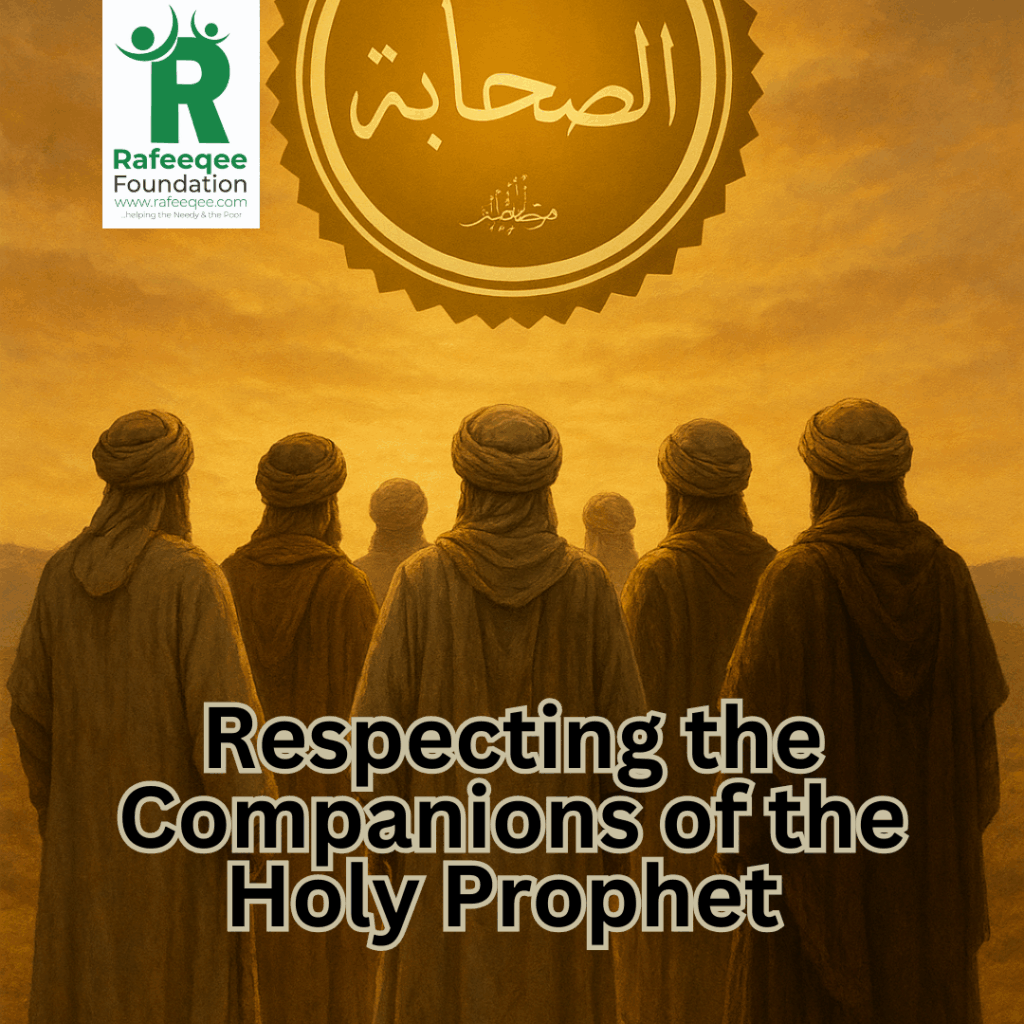Dawwah, Islamic Principles, Religion, Sunnah
Respecting the Companions of the Holy Prophet
The Companions of the holy Prophet Muhammad (ﷺ), known as the Sahabah, occupy a position of unmatched honor and reverence in Islam. They were the chosen generation through whom Allah preserved and transmitted His final revelation. Their faith, sacrifices, and steadfastness became the living proof of divine guidance in action. To love and respect them is part of faith, and to insult or belittle them is a sign of deviation and corruption of heart. Allah Himself praised them in multiple verses of the Qur’an, and the Prophet (ﷺ) warned his followers against speaking ill of them. Understanding their status is not merely a historical matter; it is a theological and spiritual obligation that safeguards the integrity of our religion.
The Honorable Status of the Companions
The Qur’an and Sunnah highlight the noble status of the Companions. Allah testifies to their sincerity and righteousness in the Qur’an:
“Muhammad is the Messenger of Allah, and those who are with him are severe against the disbelievers and merciful among themselves. You see them bowing and prostrating, seeking bounty from Allah and His pleasure. Their mark is on their faces from the effect of prostration ….” [Al-Fath 48:29].
They were not mere followers; they were the carriers of divine light to the generations that followed. Allah further declares:
“And the foremost (As-Sabiquun al-Awwaluun) among the Muhajiruun and the Ansaar, and those who followed them in goodness; Allah is pleased with them, and they are pleased with Him. He has prepared gardens under which rivers flow, wherein they will abide forever. That is the supreme success” [At-Tawbah 9:100].
This verse establishes that the earliest Muslims those who migrated from Makkah (the Muhajirun) and those who supported them in Madinah (the Ansar) earned Allah’s eternal pleasure. Anyone who follows them with righteousness will share in their reward.
Their Sacrifices and Legacy
The Sahabah sacrificed everything for Islam wealth, comfort, family, and even their lives. They endured persecution in Makkah, hunger in Madinah, and the heat of battle in Badr, Uhud, and beyond. Through them, the message of Islam reached every corner of the world.
Abu Bakr (may Allah be pleased with him) spent his entire wealth in supporting the Prophet (ﷺ). Umar (may Allah be pleased with him) stood firm in justice and governance. Uthman (may Allah be pleased with him) equipped the army of Tabuk and compiled the Qur’an into one Mus-haf. Ali (may Allah be pleased with him) displayed courage and wisdom in every trial. Each companion had a role that collectively built the foundation of the Ummah.
The Prophet (ﷺ) said:
“The best of my nation is my generation, then those who follow them, then those who follow them.” [Al-Bukhari, 2652; Sahih Muslim, 2533]
This hadith establishes the superiority of the Companions and the next two generations, known as the Ás-Salafu As-Soolihuun (the righteous predecessors). Their understanding of Islam is the standard against which all later interpretations must be measured.
Spiritual and Moral Consequences of Belittling or Reviling the Companions
The Qur’an and Sunnah warn against disrespecting the Companions. The Prophet (ﷺ) said:
“Do not revile my Companions. For if one of you were to spend gold equal to Mount Uhud (in charity), it would not equal a mudd (handful) of what they spent, nor even half of it” [Al-Bukhari:3673, Muslim, 2541].
This hadith shows that no later generation can match the virtue of the Companions. Their sacrifices in the early days of Islam, when belief itself was tested by fire, outweigh all later acts of worship.
Imam Ahmad ibn Hanbal said:
“If you see a man speaking badly about any of the companions of the Messenger of Allah, peace and blessings be upon him, be wary of his practice of Islam.” [Tārīkh Dimashq 59/209]
- Corruption of Faith: Belittling the Sahabah reveals hypocrisy and indicates a defect in one’s faith. The Prophet (ﷺ) said:
“Love for the Ansar is a sign of faith, and hatred for them is a sign of hypocrisy.” [Al-Bukhari:17; Muslim: 75].
- Undermining the Qur’an and Sunnah: The Qur’an and Hadith reached us through the Companions. Questioning their integrity doubts religion.
- Loss of Guidance: Those who malign the Sahabah lose the spiritual light that comes from following their example. The Qur’an commands:
“And whoever opposes the Messenger after guidance has become clear to him and follows a path other than that of the believers, we will turn him to what he has turned to and burn him in Hell, and what an evil destination” [An-Nisa 4:115].
(The “believers” here refers to the Companions and those who followed them.)
The Way of the Believers: Love and Respect
True believers love all the companions without exception. While they recognize that some disagreements occurred among them after the Prophet’s death, they refrain from judging, for Allah has already forgiven them.
Allah says:
“And those who came after them say, ‘Our Lord, forgive us and our brothers who preceded us in faith, and put not in our hearts any hatred toward those who have believed. Our Lord, indeed, you are Kind and Merciful” [Al-Hashr 59:10].
This verse beautifully captures the attitude of the righteous believers: love, gratitude, and prayer for the Companions; not hostility or mockery.
Conclusion
The Companions of the Prophet Muhammad (ﷺ) are the stars by which the Ummah navigates. Their faith, courage, and sincerity preserved Islam and made it reach every corner of the world. To honor them is to honor the Prophet (ﷺ) and the message of Allah; to belittle them is to oppose divine testimony and the consensus of the believers.
May Allah fill our hearts with love for the Sahabah, forgive their shortcomings, and unite us with them in the company of the Prophet Muhammad (ﷺ) in Jannah.
To support our mission at Rafeeqee foundation click here

